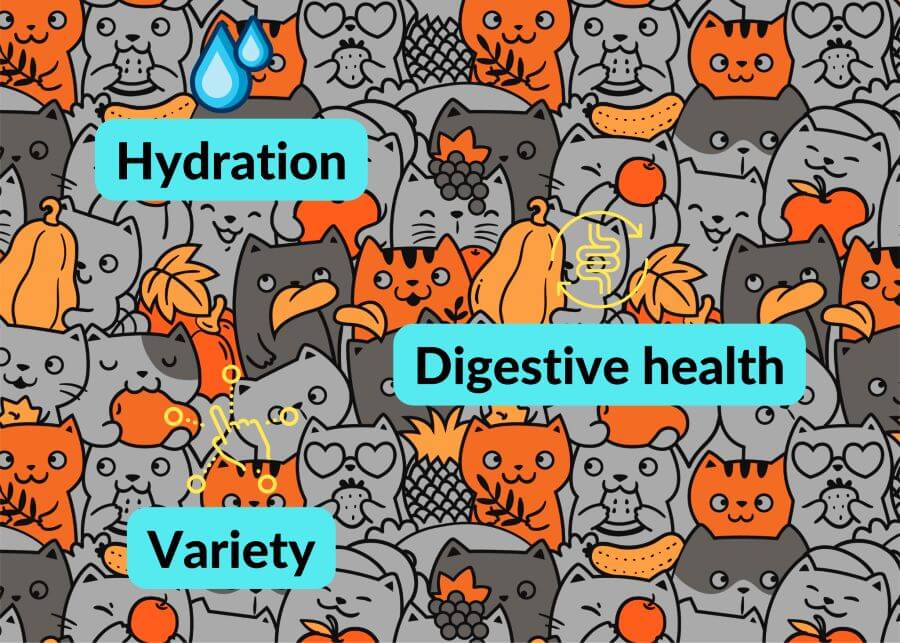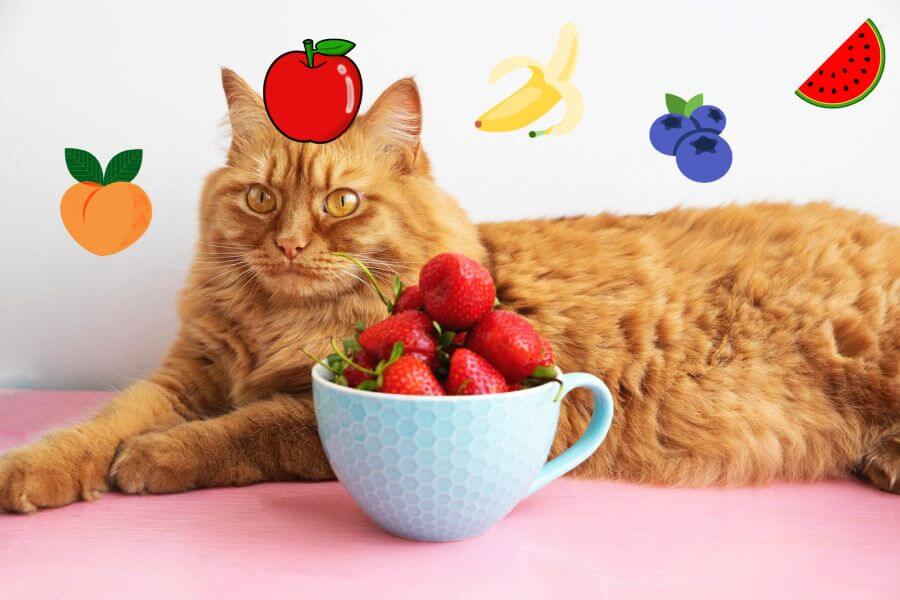Key Takeaways
- Cats can eat certain fruits, and the increased fiber intake and moisture can be beneficial for them ✔️
- Apples, bananas, pears, berries, watermelon, cantaloupe, cherries, kiwi, nectarines, peaches, and plums are all good choices 🍎🍌🍐🫐🍉🍒🥝🍑
- Not all fruits are safe for your pet to eat. Grapes and raisins are toxic, and some cats may have sensitivities to certain fruits 🍇❌
- Fruit that contains pits or seeds can be dangerous ⚠️
- Fruit that is high in sugar can lead to weight gain and other health problems ⚠️
What Fruits Can Cats Eat? Complete List
If you’re wondering, “What fruits can cats eat?”, look no further. We’ve got all the information you need right here. As it turns out, there are quite a few fruits that cats can enjoy. In fact, many are actually good for them. Here are some of the most popular options:
- Apples: A great source of fiber, apples are a tasty treat for cats.
- Bananas: Another high-fiber fruit, they’re also packed with potassium.
- Pears: They’re a good source of vitamin C and antioxidants.
- Blueberries: These little berries are packed with nutrients, including vitamins A, C and K.
- Watermelon: A juicy summer favorite, it’s a good source of lycopene and other antioxidants.
- Cantaloupe: This fruit is a good source of vitamin A and beta-carotene.
- Cherries: They’re a good source of antioxidants.
- Kiwi: This hairy fruit is a good source of vitamin C, potassium and magnesium.
- Nectarines: They’re full of vitamins A and C.
- Peaches: With a nutritional value similar to nectarines, they’re another curious snack.
- Plums: A brilliant source of fiber and potassium.
- Raspberries: Packed with antioxidants and vitamin C, they can really boost your pet’s health.
- Strawberries: These favorite fruits of cats are a good source of antioxidants, potassium and vitamin C.
Editor’s Note 🪶
We’re listing vitamin C among the benefits as a fact. But the truth is, cats and dogs don’t need this vitamin in their food. Their bodies are perfectly capable of producing it on their own. Still, it’s good for yourself, so if you like sharing snacks with your furry friend, this will help you choose!
Health Benefits of Fruits in a Cat’s Diet
Fruits offer a number of health benefits for felines. Many fruits are packed with antioxidants, vitamins and minerals, which can help boost your cat’s overall health and immune system. Additionally, they provide dietary fiber that helps keep cats’ digestive systems healthy. Fruits are a healthy snack alternative for cats and can be given as part of a regular diet.
Cats can eat fruit, and here are some health benefits for them:
- Increased fiber intake, which can help with digestion and bowel movements.
- Added moisture in your cat’s diet, which can be important for cats who eat mainly dry food.
- Added variety and flavor, which can be good if your cat is bored with their food.

What fruits can cats eat regularly? Those that are low in sugar are best. Melons and berries are amazing choices. Don’t overdo it, though – you don’t want to give your pet too much of a good thing!
How to Feed Your Cat Fruits and Vegetables Safely?
Here are some basic rules you should remember when feeding your kitty fruits or vegetables:
- Not all fruits are safe for your cat to eat. Stay away from grapes and raisins, as they’re toxic to felines.
- Some cats have allergies to certain fruits, so it’s best to start with small amounts and watch for any signs of discomfort.
- Do not give your cat any fruit that contains pits or seeds, as these are dangerous.
- Avoid giving your cat fruit that is high in sugar (such as dried fruit), as this can lead to weight gain and other health problems.
- Always make sure to wash any fruit before giving it to your cat. Fruits can be contaminated with bacteria or pesticides, so it’s important to clean them off. Otherwise, your cat could suffer from diarrhea, kidney damage and many other health issues.
- Citrus fruits contain acid that can upset your cat’s stomach. Instead, try feeding him or her small amounts of fruit like blueberries, raspberries, or strawberries.
- Remember that cats are carnivores, and fruits can only be a tasty addition to their diet. A cat’s diet should be based on meat and nutritionally balanced cat food.

If you’re looking to give your cat a fruit treat, chop the fruit into small pieces so they can easily eat it. And always make sure that there is plenty of clean water available to your cat, as they need hydration to stay healthy. Now you know the answer to “What fruits can cats eat?”. Thanks for reading!
Frequently Asked Questions
What Fruits Are Toxic to Cats?
Grapes are definitely toxic to pets. Avocado is also sometimes said to be, although it hasn’t been proven that the flesh contains enough of the toxin (persin) to harm your cat. If you live by the rule “better safe than sorry,” then don’t give your pet either of these fruits.
What Is a Cat’s Favorite Fruit?
Many cats’ favorite fruit is cantaloupe. It’s hydrating, tasty, and its scent is said to resemble animal proteins. If your kitty is interested in any other fruit (that is safe for them), try offering them some – maybe they’ll find a new favorite!
Is It OK for Cats to Eat Fruit?
As long as you feed the fruit as an occasional treat, yes. It shouldn’t take up more than 10% of your pet’s daily calorie intake. Stick to the guidelines, and rest assured that their body is grateful for the additional nutrients.
Similar Posts:
- Can Cats Eat Fruit? What to Remember About Human Food
- Can Dogs Eat Kiwi Safely? The Truth About Kiwis and Dogs
- What Fruits Can Dogs Eat? 10 Safe Fruits For Dogs
- Can Dogs Eat Cherries? Are Dried Cherries Safe for Dogs?
- Can Dogs Eat Honeydew, Cantaloupe or Watermelon? Feeding Melons to Dogs
- Can Dogs Eat Dragon Fruit?
- Can Dogs Eat Persimmons? Are the Seeds or Pits Bad for Dogs?
- Can Dogs Eat Nectarines and the Dangers of Pits

